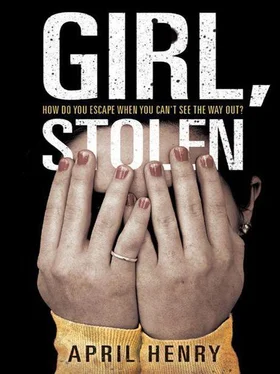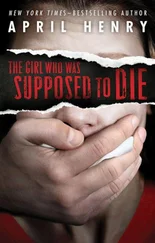Duke , Cheyenne thought. Griffin and Duke and Roy. And doing something with electric saws out in the middle of nowhere. There can only be one place like this .
“Please, mister,” she said, “can I have a glass of water?” There. Maybe calling Griffin “mister” would make him think she didn’t know his name. Cheyenne gave a little fake cough, but it quickly turned into a real one. She coughed and coughed until her lungs ached. She heard him leave again, then water running, his footsteps hurrying back.
“Here.” He put his hand on the back of her head and tried to tilt the glass to her lips. Most of it sloshed over her coat. Some of it ran down her neck. Cheyenne gulped, choked, sputtered. A little of it went down her throat, which felt as if it were on fire. Awkwardly, he patted her face with her scarf.
“You should lie down,” he finally said. She heard him set the glass down. “I’ll be back later.”
He closed the door. She listened for the sound of his footsteps disappearing down the hall. The front door opened and closed. As soon as it did, she rolled off the bed and began to search. With her leg tethered, she was only able to get a few feet from the bed. But Cheyenne used her free foot. She turned around and fluttered her fingers against anything she could reach with her hands tied behind her back, even bent forward from the waist and literally nosed around what she thought was a desk.
She didn’t know what she was searching for, and she didn’t know that she would know even if she found it. Cheyenne needed something. Something that would tip the balance. She knew it was too much to hope for a pocketknife, a telephone, a pair of scissors. But even a pen would be good. She might be able to hide a pen and use it later to stab someone. The room was surprisingly neat and empty. Even though they didn’t seem like the kind of people who would have a guest room, maybe that’s what this was.
The only useful item Cheyenne found was on top of the desk. She ran into it with her nose and nearly tipped it on its side. The glass! She hooked it with her chin and pulled it back to the edge of the desk. Then she turned around and grabbed it with the fingers of her bound hands.
Whole it was nothing. But broken? She pinched the top edge between the thumb and fingers of her right hand. Without giving herself time to think, she swung her hand in a short, sharp arc that ended when the glass hit the edge of the dresser.
 THIS MIGHT CHANGE THINGS
THIS MIGHT CHANGE THINGS
Walking back to the barn, Griffin thought that he had never had a girl in his room before, let alone on his bed.
And it was weird to be able to look right at someone and know that they had no idea that you were looking at them. And you could stare as long as you wanted without ever worrying about being caught. Although if Cheyenne hadn’t told him she was blind, Griffin might not have known. When he spoke, she seemed to look right at him. Maybe her right eye wandered a bit, that was all. She had beautiful eyes, so dark they looked all pupil.
It was easier to think about her being blind than it was about what to do now. Griffin wished life was like one of the computers at his old school, that he could just make a few clicks and restore things to the way they had been five minutes before he spotted the keys dangling from the Escalade’s ignition. Instead, he had made one impulsive decision after another, and now he was stuck with the results.
Griffin lit the cigarette Cheyenne had made him take out of his mouth earlier. He could hear the radio playing from inside the barn. The sound floated on the crisp air. For some reason, TJ and Jimbo liked to listen to this right-wing radio talk-show host, some guy who was constantly going off about illegals and health care and homos. Griffin thought it was kind of funny how they were always agreeing with him, saying “damn straight!” when the radio host would probably have happily strung up the two of them himself.
Iced-over puddles cracked under his feet. It hadn’t snowed yet, but it felt like it might. Griffin liked how the snow shook a white blanket over everything, softening all the edges. Take the remains of one car — a Honda that had been relieved of its wheels, door panels, seats, and stereo — sitting midway between the house and the barn. Covered in snow, it would become a beautiful, abstract sculpture.
His dad had driven the Escalade into the barn and was now walking around it, eyeing it up and down. The SUV was cherry. It had less than fifteen thousand miles on it. Stealing it should have been a real coup. It would have shown his dad that Griffin was capable of playing in the big leagues — if Cheyenne hadn’t been in the back. But that was a pretty big if .
“Are you going to replace the VINs?” Griffin asked Roy. A VIN — vehicle identification number — was stamped in several places on all cars. Basically, it was a car’s fingerprint. But you could take the VIN from a salvaged car and put it onto a stolen car, in essence swapping the fingerprint of a wanted car for a legal one.
Roy ran his thumb over his lip. “I don’t know. It’s probably too hot to risk it. I’m thinking maybe we should just slap some new plates on it for a bit and have you ditch it up in Washington, like the forest or something. You could throw that old moped in the back, and then when you got there put the old plates back on and wipe the whole thing down and use the moped to get back. Leave it someplace it won’t get found until next spring.”
“We could get fifteen grand for it, easy,” Griffin protested.
“We could get fifteen years for it, easy.” There was an edge to Roy’s voice. “In Oregon, there’s minimum sentences for kidnapping and no plea-bargaining. If anyone finds out we’re involved, we’ll be in deep for sure.” The anger returned, as Griffin had known it would. “Just what in the hell do you think you’re going to do with her?”
They had been living on the wrong side of the law for a long time, but it had always been property crimes. Folks who lived around here maybe knew that Roy ran an odd little body shop. But they weren’t the kind to ask questions about why it didn’t advertise in the yellow pages, didn’t have a sign out front, and didn’t accept customers off the street.
“Look, she can’t even see us,” Griffin said. “So she can’t say what we look like. She doesn’t know our names. She has no idea where we are. We can keep the car and trade plates and VINs. And tonight I’ll drive her out to the middle of nowhere and make her get out. By the time anybody finds her, I’ll be long gone.”
But Roy had stopped paying attention to Griffin. He was holding up one hand, his eyes narrowed down to slits as he listened to the radio.
The announcer was saying, “Coming up in the noon news — police are investigating the daring kidnapping of the sixteen-year-old daughter of Nike’s president. She was taken at ten this morning from the Woodlands Experience shopping center.”
Nike’s president? Griffin thought. Nike had started out as a running shoe company but now made clothes and shoes for every kind of sport or for people who just liked the look of their clothes.
Roy turned up the radio. In silence, the two of them listened to two commercials, one for a law firm, the other for Burgerville.
The female announcer came back. She said breathlessly, “Police say sixteen-year-old Cheyenne Wilder, daughter of Nike’s president, Nick Wilder, was kidnapped shortly after ten this morning at the Woodlands Experience shopping center. Her father spoke to reporters a few minutes ago.”
A man’s voice, strained but professional sounding, said, “My daughter is blind. We lost her mother three years ago in the same accident that took Cheyenne’s sight. And Cheyenne’s also very ill. In fact, she was returning from the doctor’s office when she was kidnapped. If she doesn’t receive treatment immediately, she could die.”
Читать дальше

 THIS MIGHT CHANGE THINGS
THIS MIGHT CHANGE THINGS










